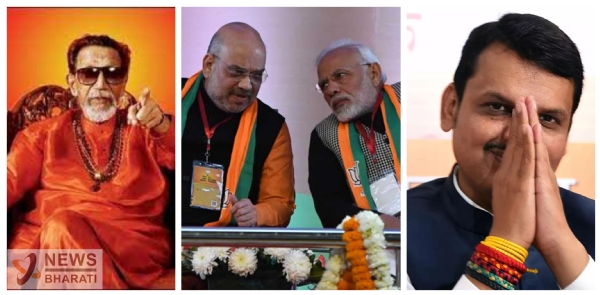BJP, democracy, and remote control
Contrary to everyone’s expectations, Fadnavis did not become the CM, he announced he would stay out of the cabinet. This was a huge shock to a lot of people.
Total Views |
On the 30th of June, Maharashtra witnessed twin shocks in a span of two hours. One was announced in a press conference by then Leader of Opposition of the Maharashtra legislative assembly, Devendra Fadnavis, in the presence of ‘rebel’ Shivsena leader Eknath Shinde that the latter would be the Chief Minister (CM) of Maharashtra and not the former. Contrary to everyone’s expectations, Fadnavis did not become the CM, he announced he would stay out of the cabinet. This was a huge shock to a lot of people.

As if this wasn't enough, within an hour’s time, BJP national president JP Nadda announced that he and the central leadership has ‘requested’ Fadnavis to join the cabinet and take oath as the Deputy Chief Minister (DCM) of the state. This was perhaps the bigger of the two shocks for both the admirers and the rivals of Fadnavis. His supporters were sad that their leader, after two and a half years of waiting would not get the CM’s chair which he held for 5 years straight. He was the first one to do so after more than 40 years. Some of his rivals and critics were also shedding crocodile tears in order to tease and taunt him and his supporters. But if we look at this decision after some critical thinking, we might realize a few things.
Also Read: Nupur Sharma, Brandenburg test, and 295A
There are many conspiracy theories about how this move to make Fadnavis DCM is to cut him down to size, to cut off his wings before he could take on a ‘bigger’ role. There are also some very sound arguments about how his experience as the CM of the state for 5 years would benefit the government to function better, how his oratory inside as well as outside the government would benefit the new coalition, and how his legal, as well as political knowledge, would help the new CM govern even better. But all these are conjectures by the BJP haters or BJP supporters. But there is one point that most observers seem to be missing, especially in the context of Maharashtra, that is democracy and ‘remote control government.’
Also Read: The Muslim area trap
After a very well-known example of the UPA government, in which PM Singh was a ‘puppet’ PM while the UPA chairperson, as well as Congress President Sonia Gandhi, was taking all the major decisions, remote control government became a popular term across India. But in the case of Maharashtra, remote control government was not a new thing, after all when Manohar Joshi was the CM from 1995 to 1999, everyone knew that the remote control of the government is in the hands of Shivsena Chief, Bal Thackrey. Allegedly, all the major decisions were taken not from Varsha Bungalow (official residence of CM of Maharashtra), but from Matoshree (Thackrey family residence). Later on, after 2019, when the Maha Vikas Aghadi (MVA) government came into existence, everyone knew that even though Uddhav Thackrey is the CM, it is the NCP supremo Sharad Pawar who has the remote control. Allegedly, many important decisions were taken from Silver Oak (Sharad Pawar’s residence in Mumbai) and not from the Varsha Bungalow.
Also Read: Why attacking Ira Khan is utterly idiotic?
This kind of structure of a government creates an extra-constitutional authority. The BJP did not want to create an extra-constitutional authority in Maharashtra from the BJP’s side. The BJP has never had any extra-constitutional authority controlling any government by a ‘remote control.’ Even during the ‘Yuti’ government, of 1995-1999, top BJP leaders of the state, Gopinath Munde and Nitin Gadkari, became ministers in the government. Either of them could have decided to stay outside the government and control the BJP ministers from outside like Bal Thackrey was doing with the Shivsena ministers. But BJP did not opt for that option. The BJP and especially PM Modi have been talking about the constitution and how that is supreme. When PM Modi first entered the parliament he bowed down in front of the parliament as well as the constitution inside the parliament hall.
The BJP has put money where its mouth is by letting off the temptation of creating an extra-constitutional authority. And Fadnavis has also very graciously accepted this new job as party discipline. Creating extra-constitutional authorities is very appealing to the supporters of all parties. It creates a feeling of, “Our leader can do anything in this government without even being in the government.” It also allows that leader to say, I do not have the temptation of power. But being in power, and having democratic checks and balances over all of your actions is difficult. Being open to all the criticism from the opposition as you are now in the government, is difficult. The BJP has shown that it will not cop out the easier way of extra-constitutional authority, it will work under the democratic structure, the BJP has shown that it is truly a conservative party.


